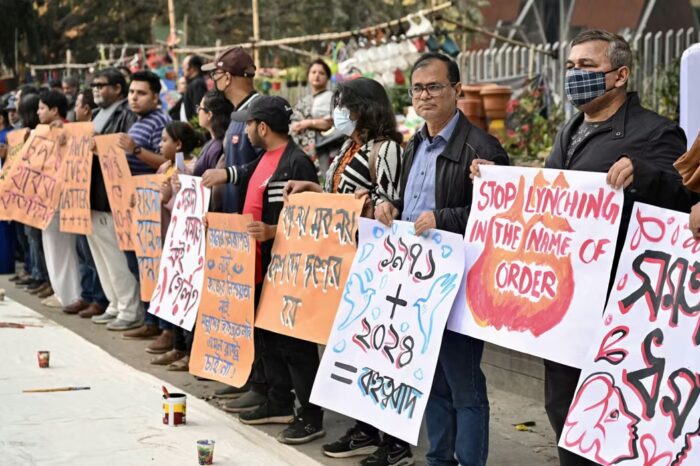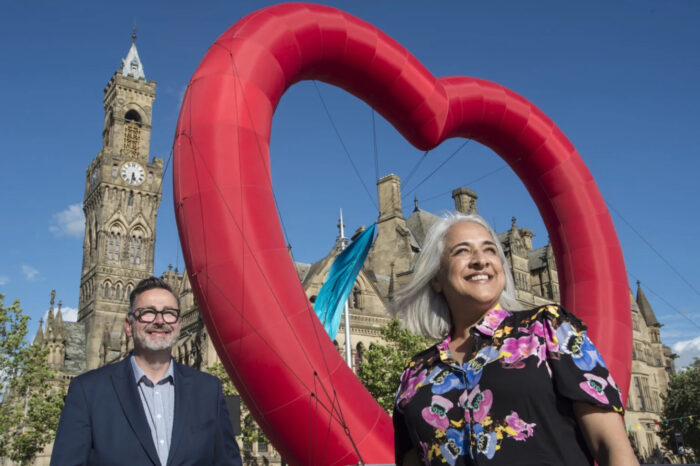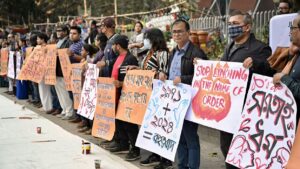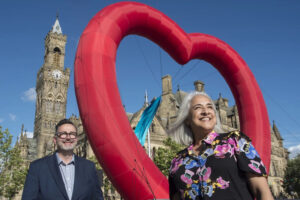The past, the present, and the future: an exclusive interview with Anas Sarwar

Image by Jeff J Mitchell/Getty Images
By Swarupa Tripathy
Born in Glasgow to Pakistani parents, Anas Sarwar has achieved several milestones in his career as a politician and the leader of the Scottish Labour Party. But, behind the success and the tough exterior, is a man who has been through several trying times, loves spending time with his children and wants to see major changes for ethnic minority groups in UK politics.
Sarwar traces his origins to post-partition Punjab, Pakistan, from where his maternal grandfather travelled to the UK in the 1940s, seven years before the British rule ended. After his arrival in Lossiemouth, Scotland, he started working as a bootlegger, going door-to-door selling clothes and trying to earn an income for himself, with the intent to eventually return to Pakistan.
His paternal grandfather arrived in the UK in the 1960s, and worked as a bus driver. His mother eventually arrived in Lossiemouth after her father decided to bring the family to Scotland, and his father arrived when he was in his mid-twenties. They got married and then decided to move to Glasgow.
“My dad’s first business involved selling eggs and crisps around shops and then slowly after that he built his own business supplying shopkeepers. From that he decided to see if he could supply individual shopkeepers, continued building up, and then obviously went into politics himself in the 1990s,” Sarwar explains. As a result, he informs, that his upbringing was very focused on politics.
Sarwar reflects on the challenges he faced as a Muslim kid growing up in Glasgow and the strength his mother gave him to overcome them. “Threats and abuse was a normal part of our life, and it became a new normal for us. But again, through the inspiration of our mother, who was the rock of our family, the heart of our family, in many ways mum was both my mum and my dad because we saw very little of my father when we were growing up. But, she was always the person that encouraged us and pushed us, that drove us and gave us our values,” he said.
Having studied dentistry at the University of Glasgow, Sarwar made a dynamic shift in his career to become a politician. His explanation for doing so is attributed to him wanting to do more “community service”. “My family has got a really strong relationship with the Sikh community and Hindu community in Scotland and much more”, he says, adding that from a very young age, he was taught by his parents that wealth in the form of fancy cars or a house was not worth anything. Instead, giving back to the society was encouraged to lead a fulfilling life.
Sarwar also informs that he enjoys interacting with people, which is another reason why he chose politics. “I love talking to people. I love learning about their life, learning about what drives them, learning about what fears they have, learning about what aspirations and hopes they have, and learning from them about the ideas they have about how to build a better nation, so that side of it also drives me.”
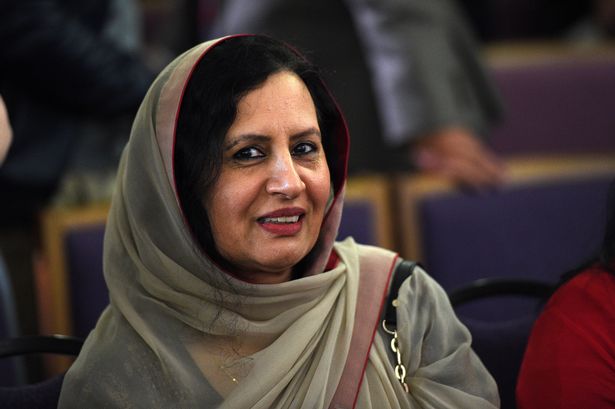
Anas Sarwar’s mother Perveen Sarwar (Image courtesy: Daily Record)
On a local level, Sarwar went on to build a strong relationship with the members of the local community, many of whom drove his community activism. He asserts that these people deserve the credit “because when you have good times, lots of people want to be your friends. When you’ve got dark times, that’s when you realise who your true friends and inspiration are,” he adds.
Other than his parents and the local community members being huge sources of inspiration, Sarwar revealed that there are other well-known international figures who have influenced him. “I think politically, obviously, you take inspiration from big global figures like Nelson Mandela as well as local and national figures. I took great inspiration from Gordon Brown, a former Scottish MP who has achieved great things, first as chancellor, then as prime minister,” he said.
As a person of Asian origin, several roadblocks came in Sarwar’s path to success. As the son of a successful politician, it was normal for people to assume that he would not have to face any issues in the field, as he had easier access and more connections. However, while starting out, he struggled to find his own identity, separate from his father, which led him to “work even harder than others” to prove that he had something to offer in his own right.
Second was racism and Islamophobia he had to face from a very young age which discouraged him from being a part of elected politics and led him to take up dentistry instead. But, his mother reassured him and told him not to let others decide which direction he wanted to go in his life.
The third roadblock came in the form of crippling successive defeats, which in hindsight, were some of the best incidents to have happened in his life. “I went through a very bruising leadership election in 2017, and I, of course, lost an election in 2015. But in many ways, those two defeats were the best things that ever happened to me.” He adds, “I think I found myself and I generally believe I’m a better human being, a better politician for those two defeats.”
Reflecting on the challenges that one might face as a person of Asian origin in politics, Sarwar asks a pertinent question, “Will the public vote for an ethnic minority? Will the public vote for someone of a minority faith?” But he bases his concerns on the history of the functioning of political parties rather than the wider electorate. “The electorate vote for people based on their merits rather than a bigoted view and I hope to be able to demonstrate that. I know Scotland votes on people’s merit and I want to put myself forward. Of course, I’m blessed to be the first person of colour to lead a political party in the UK.” When asked what his favourite pastime activities were, Sarwar admits to his newly discovered love for listening to podcasts. “I’m currently listening to a podcast called The Rest is Politics, which is hosted by Rory Stewart and Alastair Campbell.” Sarwar spoke highly of Stewart, who was a Member of Parliament the same time as him but in a different political party, calling him “a thoroughly decent, clever, principled human being”. Speaking about Campbell, Sarwar says that even though he is a “controversial figure in many ways”, he is “also a real talent in terms of both his communication skills and his ability to cut through some of the big issues of the day”. Apart from listening to podcasts, Sarwar enjoys spending time with his kids, who have encouraged him to play pool, watch football and have also brought out his mischievous younger side too.
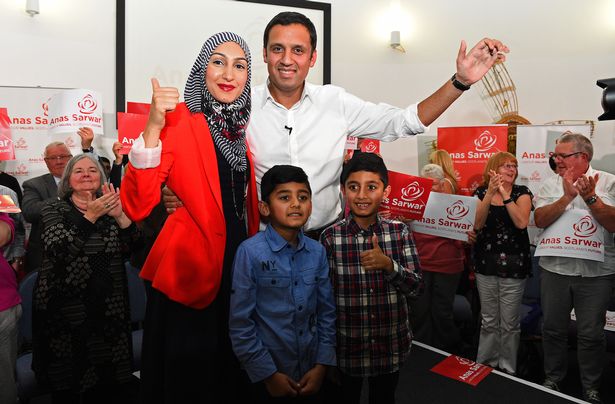
Anas with wife his Furheen and their children (Image courtesy: Daily Record)
Sarwar’s vision for the future includes the upbringing of his children. “My first and foremost judgment on my success or failure in life will be my children”, he says. He considers the health and happiness of his three sons to be his “number one goal” in life. Professionally, despite being a successful politician and the leader of the Scottish Labour Party, he says that he still has a lot to achieve in terms of promoting unity as well as getting rid of structural inequalities and injustice that “people in our country face every single day”. He also aims to “deliver quality public services where people are able to live full, fulfilling and happy lives”.
Sarwar shares that he is very proud of how far the South Asian community has come in Scotland and the immense contributions that have been made by Asian individuals in the country over the years. However, he still points out that there is scope for things to be better and issues that he wants to work on. “Continue to drive, continue to innovate, continue to grow, but recognise it is still a deep inequality that exists, partly poverty, but other forms of inequality.” He adds, “My guidance to young people across the country, if you want to be part of changing our country, changing our society, get into politics, but also get into civil service and get into our media. And because all three of those are far from diverse and far from being equal.”
The 39-year-old leader reveals the secrets of good leadership, the foremost is the quality of a leader understanding that “he or she is only about as good as the people around them”. He goes on to say that a good leader knows that they do not have all the answers and need to find them through dialogues, communication and learning other ways to understand people, issues and situations. He adds that no matter how grim things may look, a person in a leadership position has to keep it together and demonstrate resilience and a hopeful outlook “regardless of how demotivated or demoralized they may feel internally”.
Before concluding the interview, he expressed his optimism on the possibility of the Asian community achieving greater heights. He also gave an important message to the youth of the country and said, “Dream. Stay positive. Hard work. No shortcuts. And don’t be afraid to make mistakes along as you learn from them.” He goes on to add, “Social media is not the real world. Enjoy the real world and take the social media bubble with a pinch of salt.”

